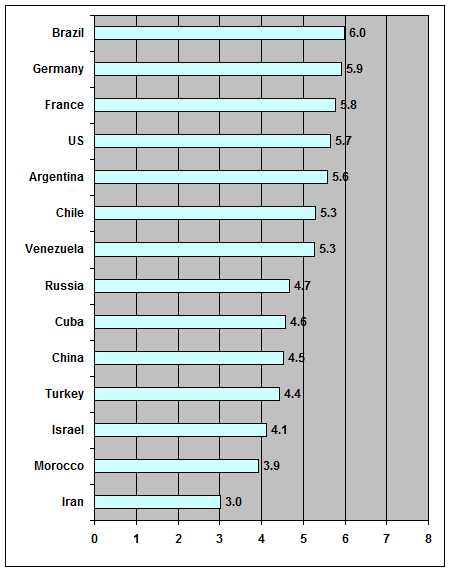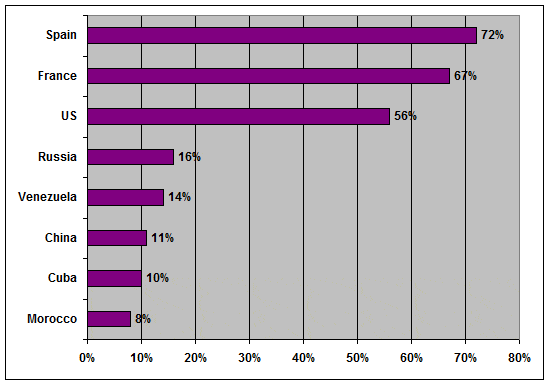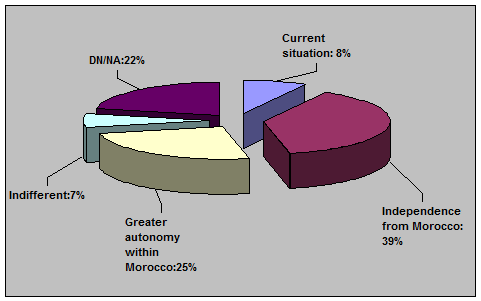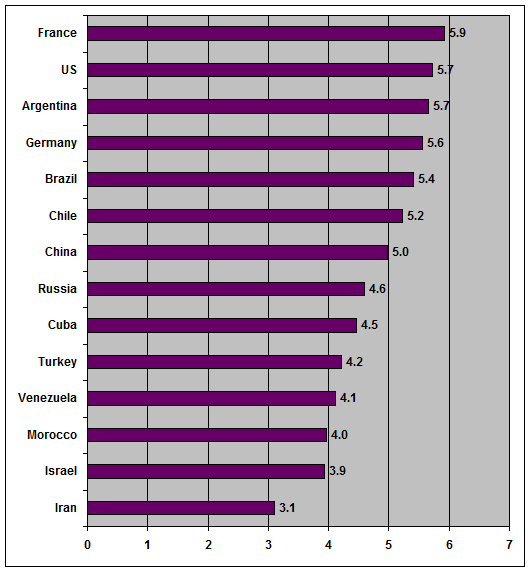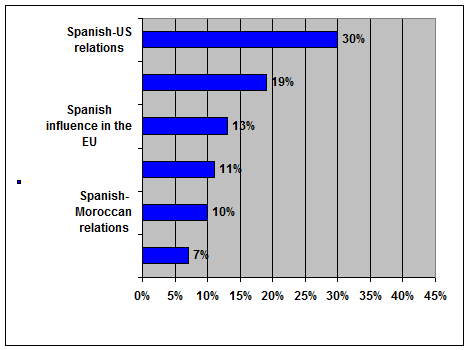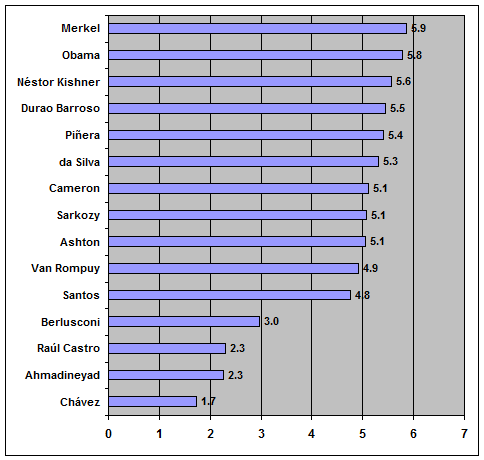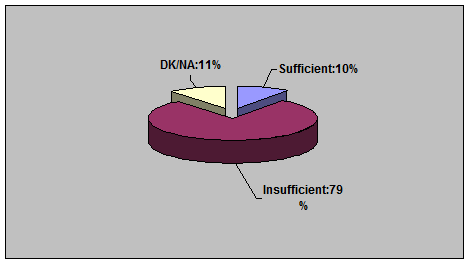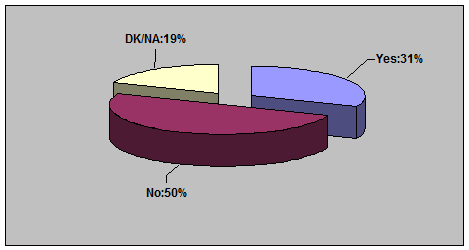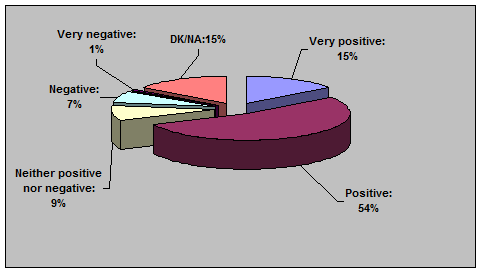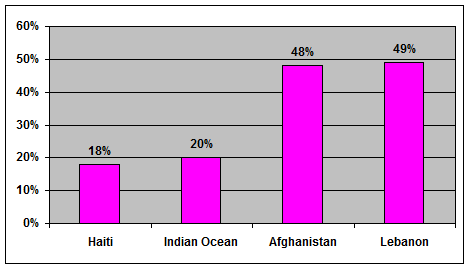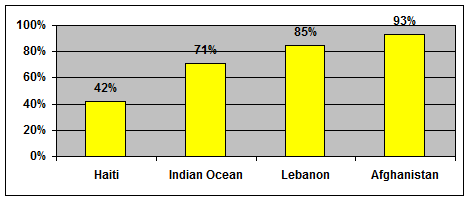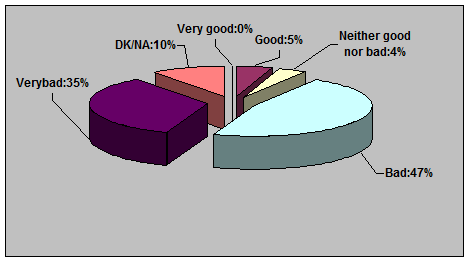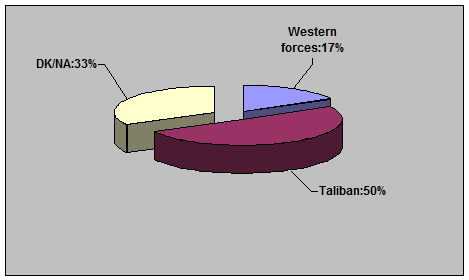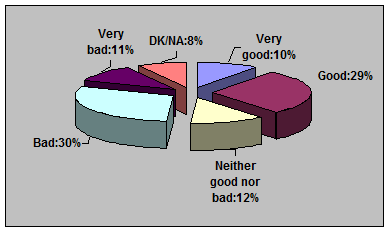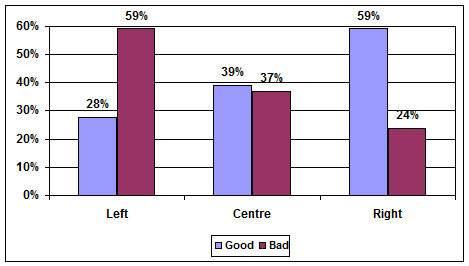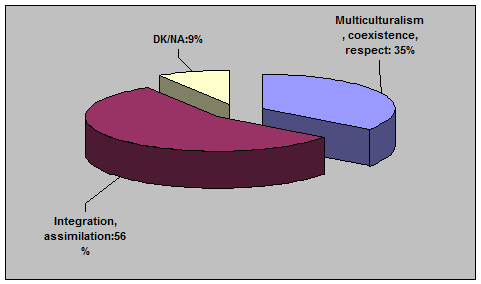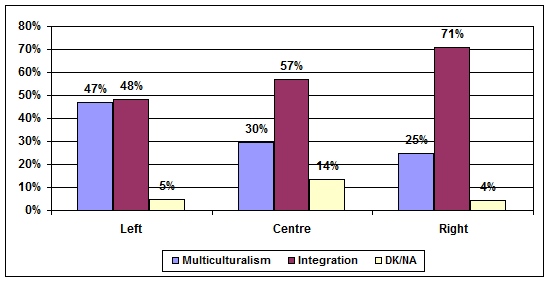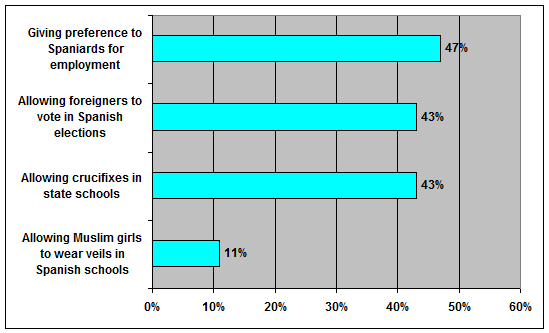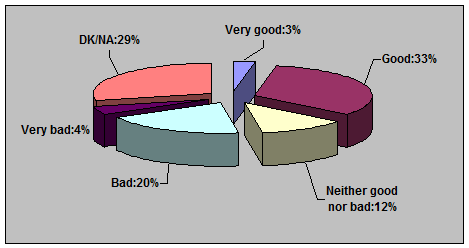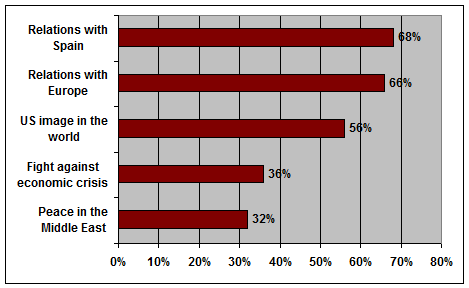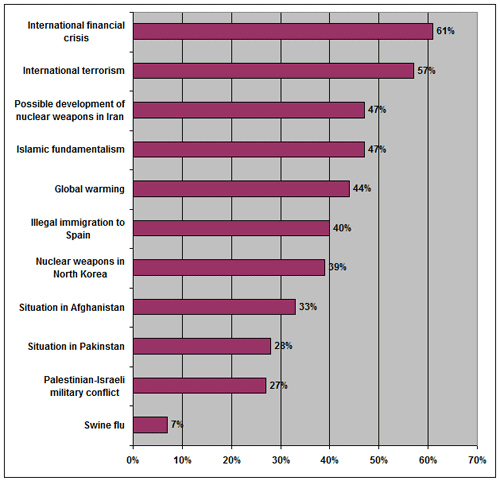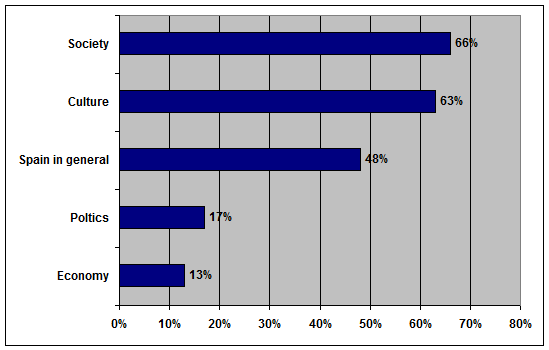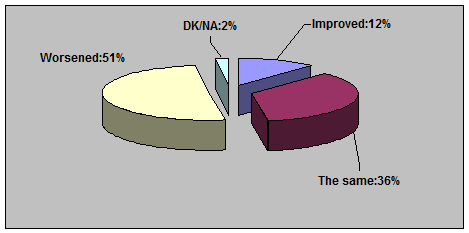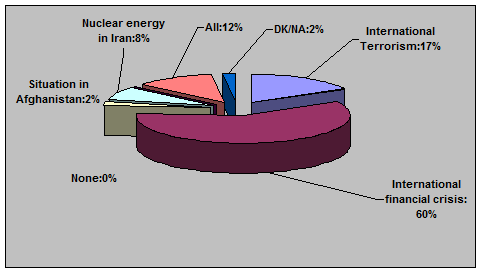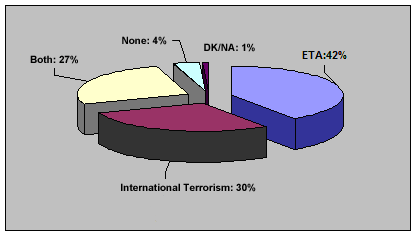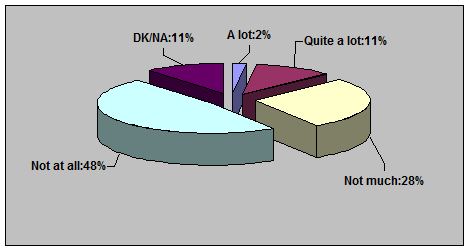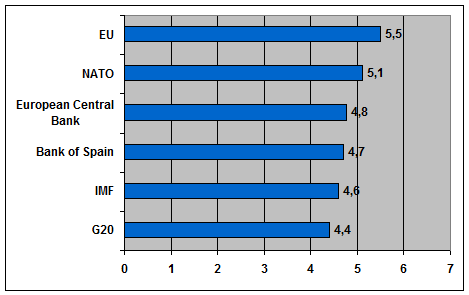TWENTY-FIFTH EDITION OF THE BAROMETER OF THE ELCANO ROYAL INSTITUTE (November 2010)
Press Summary
TECHNICAL DATA
- Universe: general Spanish population, aged 18 and over.
- Sample size: N =1,200 interviewees.
- Interview methodology used: telephone (interviewee called at home).
- Sample size: stratified, directly proportionate to the distribution of the national population, with proportionate quotas according to age and gender.
- Sample error: ±2.9 for global data (1,200n); ±4.0 for subsamples (600n) (*), p = q = 0.5 and a confidence interval of 95.5.
- Survey period: from 28 October to 10 November 2010.
- Field work: Gabinete de Análisis Demoscópico (GAD).
MOROCCO AND THE WESTERN SAHARA
- With a score of 3.9 on a scale of 0 to 10, Morocco’s rating has gone down to the same level as Israel.
On a scale of 0 to 10 (0 being very negative and 10 very positive), how do you feel about the following countries?: Brazil, Germany, France, US, Argentina, Chile, Venezuela, Russia, Cuba, China, Turkey, Israel, Morocco and Iran.
Graph 1. Average assessment of countries on a scale of 0 to 10
- A total of 80% of Spaniards feel that in Morocco human rights are not respected.
How well do you think human rights are respected in the following countries?
Graph 2. Assessment of level of respect for human rights in different countries, percentage of people responding ‘well’ and ‘rather well’
- One of every three Spaniards (39%) says the Western Sahara should be independent.
With regard to the Western Sahara, what do you think the Spain should support?
- The current situation
- Independence from Morocco
- Greater autonomy as part of Morocco
Graph 3. Western Sahara: what should Spain support?
- On a scale of 0 to 10, most Spaniards give a score of only 4 to bilateral relations with Morocco.
On the same scale of 0 to 10, how do you assess Spain’s bilateral relations with the following countries?
Graph 4. Average assessment of bilateral relations on a scale of 0 to 10
- 36% of Spaniards believe that relations have worsened over the past year, a proportion much higher than that of people who feel relations have improved (10%).
Graph 5. Assessment of evolution of several issues in 2010, percentage of people who feel they got ‘better’
- As for the immediate future, only one of every five Spaniards expects an improvement in 2011.
And on each of these issues, what do you think will happen in 2011?
Graph 6. Assessment of expectations for 2011 on various issues, percentage of people who expect they ‘will improve’
THE NEED FOR GREATER PRESSURE ON CUBA
- Cuba’s image is better than Morocco’s: 4.6 on a scale of 0 to 10. However, Raúl Castro is one of the lowest-rated international leaders: 2.3 on a scale of 0 to 10.
Graph 7. Leaders: average assessment on a scale of 0 to 10
- 80% of Spaniards feel that human rights are not respected in Cuba.
- One out of every two Spaniards says the international community should exert more pressure for Cuba to respect human rights.
Describe your opinion as to the international community’s pressure on Cuba for it to respect human rights.
Graph 8. Cuba: is international pressure sufficient?
- In this respect, most Spaniards (50%) feel the recent release of prisoners on the island does not justify a change in EU policy so as to boost political and trade relations, compared to 31% who feel it does.
The Cuban government recently released some political prisoners. Do you feel this justifies a change in EU policy so as to increase political and trade ties?
Graph 9. Cuba: does the recent release of political prisoners justify a change in EU policy?
SPAIN’S PEACE-KEEPING MISSION IN BOSNIA WAS WORTHWHILE
- Now that the Spanish military’s mission in Bosnia has concluded, 72% of those polled have a positive opinion of it.
The Spanish military’s 18-year-long mission in Bosnia has concluded. How do you assess the role of this mission?
Graph 10. Opinion of Spanish military mission in Bosnia
- But public opinion is more divided when it comes to evaluating the cost of the mission. A total of 48% feel the sacrifice of Spanish soldiers losing their lives during the mission was not worthwhile, although 40% feel it was.
Would you say that the sacrifice made by Spanish soldiers who died in Bosnia was worthwhile?
Graph 11. Was the sacrifice of Spanish soldiers worthwhile
UNCERTAINTY OVER AFGHANISTAN
- Spaniards are divided over the presence of Spanish troops in Afghanistan: half favour keeping them there and half want them to come home.
And for each of the following missions, what do think should be done with the troop levels?
- Increase
- Maintain
- Reduce
- Withdraw completely
Graph 12. Support for complete withdrawal of Spanish troops carrying out missions abroad, percentage of responses backing ‘complete withdrawal’
- A total of 95% of those polled think the Afghanistan mission is the most dangerous of all those in which Spanish troops are engaged.
Graph 13. Perception of the degree of danger for Spanish troops involved in missions abroad, percentage of those who answered ‘very’ and ‘quite’ dangerous
- There is a clear correlation between the sense of how dangerous a mission is and support for withdrawing troops: goals notwithstanding, the more dangerous a mission is considered, the less support it enjoys.
Graph 14. Correlation between the sense of how dangerous a mission is and support for withdrawing troops
- A total of 80% think the situation in Afghanistan is complex.
In your opinion, how is the situation now in Afghanistan?
Graph 15. How is the situation in Afghanistan now?
- 50% think the Taliban are winning, while only 16% feel that allied forces are prevailing in this conflict.
Who would you say is winning in Afghanistan?
Graph 16. Who is winning in Afghanistan
- In any case this does not affect the image of NATO, which is now the second most-highly rated institution by Spaniards, with a score of 5.1, surpassed only by the EU.
IMMIGRATION AND ECONOMIC CRISIS
- Spanish public opinion is divided over President Sarkozy’s decision to expel Gypsies from France: 41% are in favour, 39% are against.
Graph 17. What is your assessment of Sarkozy’s expulsion of Gypsies from France?
- Sarkozy’s measure brings to light the division between the Spanish right and left, with the former clearly in favour of expulsion and the latter against.
Graph 18. Opinion on expulsion of Gypsies from France, in relation to people’s declared ideology
- In any case, most people (56%) feel that immigrants should integrate and adopt the culture and customs of Spaniards, while 35% advocate the model of different cultures and customs co-existing side by side.
Speaking of immigration, which of these two positions would you agree with more?
Graph 19. Immigration: which position do you agree with more?
- In political terms, we now find that the right mostly tends to favour assimilation as opposed to multiculturalism, while the left is divided in half between the two options.
Graph 20. Integration vs. multiculturalism, in relation to people’s declared ideology
- Sixty-seven percent are against the idea of allowing Muslim girls to wear Islamic veils in state schools, a percentage that is much higher than that of those who support removing crucifixes (23%).
- In the current economic crisis, 47% also advocate a Spaniards-first policy when it comes to giving people jobs, as opposed to giving them to foreigners.
- Spaniards are more open to allowing foreigners to participate in elections (43%), although 34% are against this.
Now, tell me if you are in favour of or against…
Graph 21. Percentage of those polled in favour of…
OBAMA STILL ENJOYS SUPPORT
- The Spanish people respect the results of the U.S. legislative elections of November. A total of 35% see the results as positive, while 24% view them as negative.
What is your assessment of the results of the US mid-term elections?
Graph 22. Assessment of the results of the US mid-term elections
- President Obama has not lost his aura in Spain: along with Angela Merkel of Germany, he is the international leader rated highest by the Spanish people.
- In general, Obama gets good marks for his handling of all foreign policy issues. He is simply asked to make a greater effort to achieve peace in the Middle East and to resolve the International economic crisis.
Now that Obama has been in power for some time, can you tell me how you assess his achievements in the following areas?
Graph 23. Assessment of the achievements of the Obama Administration, percentages of ‘good’ and ‘very good’ responses
WORRIES AABOUT THE CRISIS
- The economic crisis has taken hold as the problem that worries Spaniards the most: 61% consider it a serious threat to their country.
Graph 24. Perception of threats, percentage of ‘very serious’ responses
- However, most Spaniards (48%) do not think the crisis has harmed the overall image of their country, compared with 30% who do.
Graph 25. Opinion on Spain’s image abroad in different areas, percentage of ‘good’ or ‘very good’ responses
- The percentage of Spaniards who feel the crisis has worsened has increased.
And how do you think the economic situation is going?
Graph 26. How is the economic situation?
- Compared with other problems, 60% choose the economic crisis, while 17% say they are most worried by international terrorism.
Of the following four problems, which would you say concerns you the most right now?
Graph 27. Which is of most concern at present?
HUGO CHÁVEZ DOES NOT COOPERATE IN THE FIGHT AGAINST ETA
- Right now Spaniards seem more worried by ETA (42%) than by international terrorism (30%).
Which do you think is a greater threat to Spain?
Graph 28. Which is the greatest threat to Spain?
- By far Hugo Chávez is the leader rated lowest by Spaniards: he gets a score of 1.7 on a 10-point scale.
- A total of 75% of Spaniards feel the Venezuelan government is not cooperating with Spain in the fight against ETA
As for ETA members living in Venezuela, do you think Chávez is cooperating with the Spanish authorities?
Graph 29. Is Chávez cooperating on ETA?
THE EU’S IMAGE IS STILL GOOF
- The crisis has not hurt the EU’s image. Among Spaniards it is the highest-rated international institution (5.5 on a scale of 0 to 10). But because of the crisis, Spaniards give failing marks to all economic organisations, be they domestic or international.
Graph 30. Average assessment of international organisations on a scale of 0 to 10
- However, nearly a year after the appointment of Catherine Ashton and Herman Van Rompuy, two out of every three Spaniards do not know who they are.
- While some negative stereotypes are growing in other countries about the EU, 60% of Spaniards continue to associate the EU with the future and the idea of progress. A similar percentage also feel that the EU is influential in the world.
Of the following sets of terms that I am going to propose, please tell me which you associate with the EU.
- Past/future
- Strong/weak
- Multicultural/cultural homogeneity
- Open/closed
- Static/dynamic
- Influential in the world/not influential
- Young/old
- Progress/tradition
- Xenophobic/welcoming
Graph 31. Adjectives chosen to describe the EU


